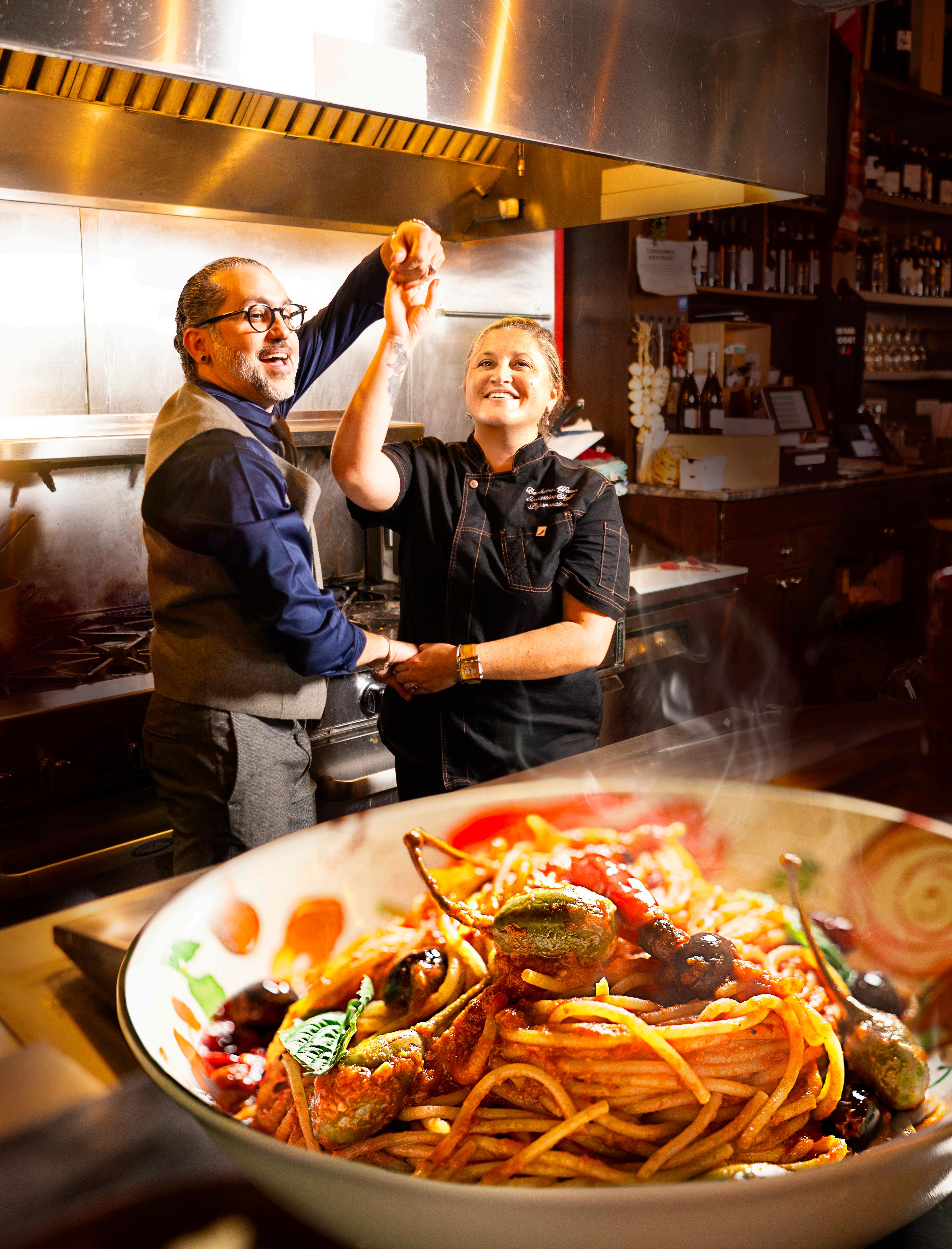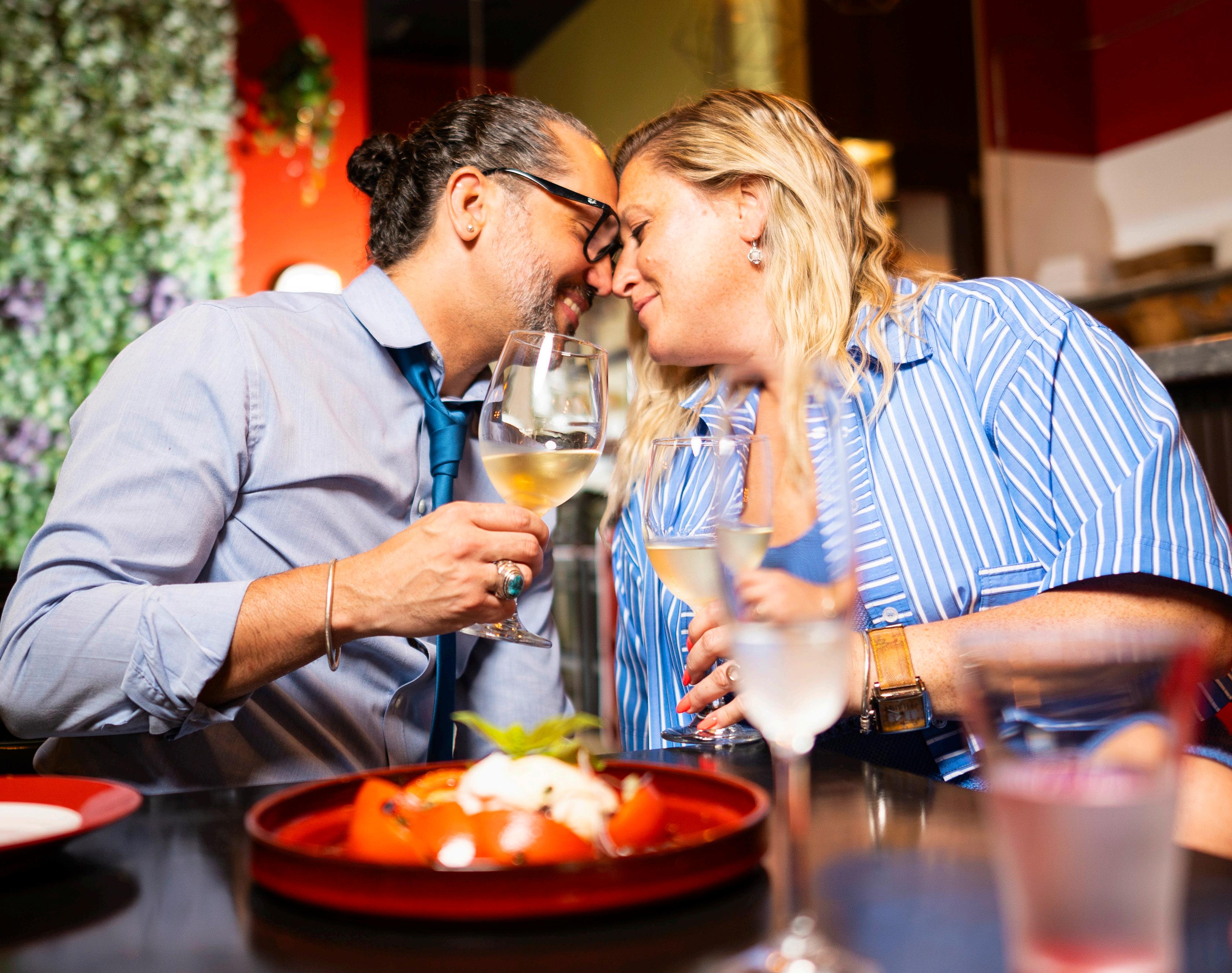
12 minute read
Amore
Amore
Peperoncino is a loud, happy restaurant. Its floors are Roman travertine; its ceiling is tin; its interior walls are vibrant red and yellow. On one side, a marble-top bar cuts a swath through half the space, standing room only on many nights. The other half is the service counter for the open kitchen, where Chef-Owner Barbara Alfano sends out more than a hundred covers a night. When she flames the wine in a seafood pasta sauce, the dimly lit room ignites, and patrons grin with delight.
The only voice louder than the happy guests is that of Sommelier Raul Lecuona, whose Tucciesque, bespeckled, preppy frat-boy baritone booms through the din, almost always followed by an extraordinary laugh. The playfulness and colorful storytelling invariably make customers feel at home and certainly come back for more.
This lively, narrow trattoria, reminiscent of eateries in Italy, is the epitome of a neighborhood haunt. No pretentiousness, just seriously delicious, authentic Southern Italian food. A home away from home—which is exactly what Barbara envisioned when she converted the former children’s boutique in the Dellagio Plaza on Dr. Phillips’ Restaurant Row 14 years ago. A stunning achievement in a notoriously volatile industry, and a testament to Barbara’s vision, skill, and resolve, and to Raul’s ability to make guests feel like family.
This was supposed to be a story about food. It was supposed to be a story about chunks of tender polpo in a stew of Calabrian chilies and spicy, fatty ’nduja sausage spooned onto crunchy bread. Uncommonly delicious balsamic-drizzled burrata; creamy arancini stu ed with eggplant; house-made bread with smoked swordsh, grilled onions, and homemade ricotta. And don’t forget the ery, sweet, smoky, slightly tangy peperoncino. Instead, I discovered a love story. Then again, isn’t that what good Italian food is?
Calabria In Cucina
At the southern “toe” of the Italian peninsula lies an Italy that few people know: a land of ancient olive groves, fragrant bergamot orchards, dramatic coastlines and terraced hillside villages. A place steeped in tradition and ritual, where the sword sh catch and hot pepper harvest are celebrated with vibrant festivals, where everyone’s nonna hosts Sunday supper, and women still roll pasta dough around knitting needles.
Chef Barbara’s obsession with the sea (and seafood!) began early, shown here at the beach in Sapri, Salerno.
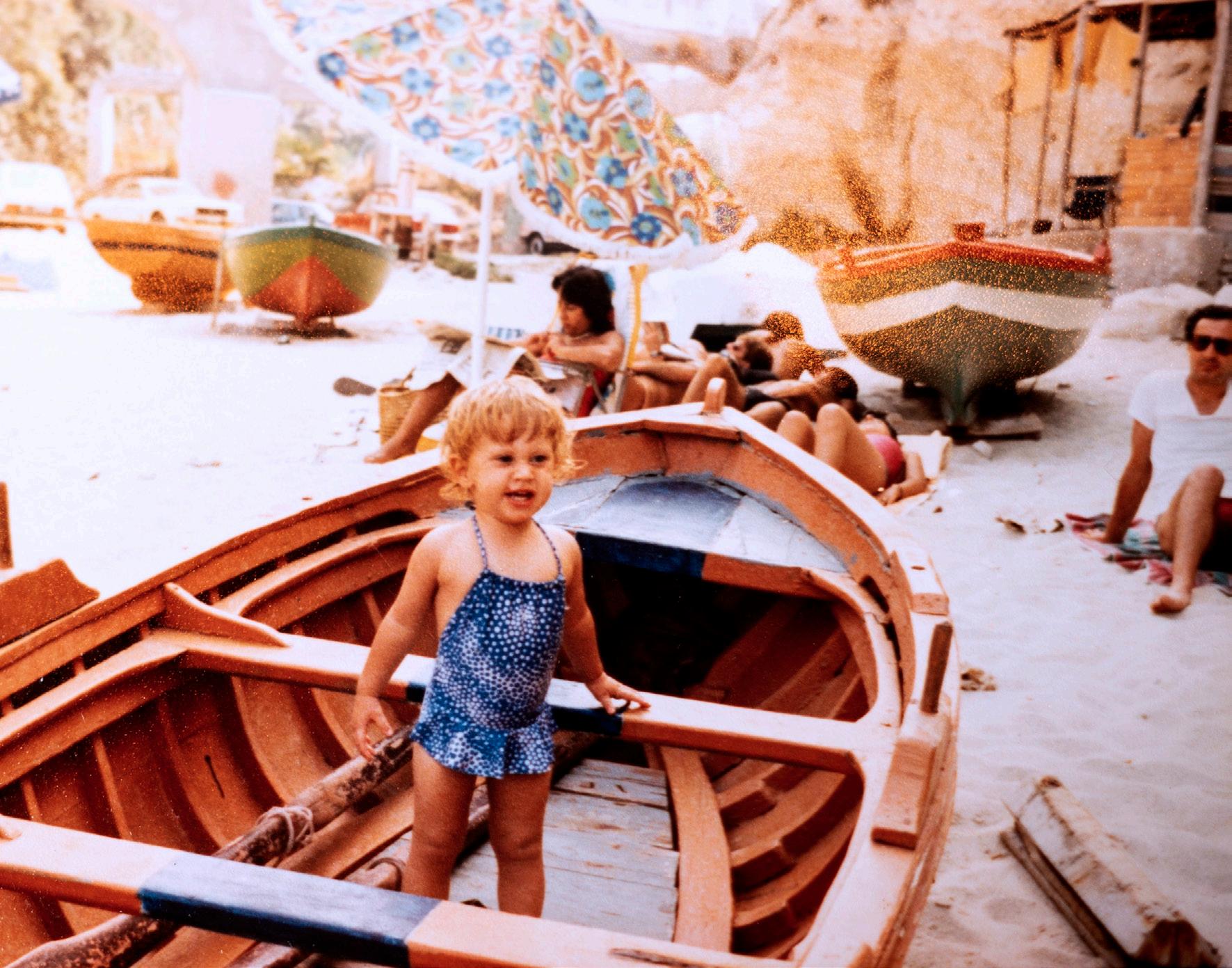
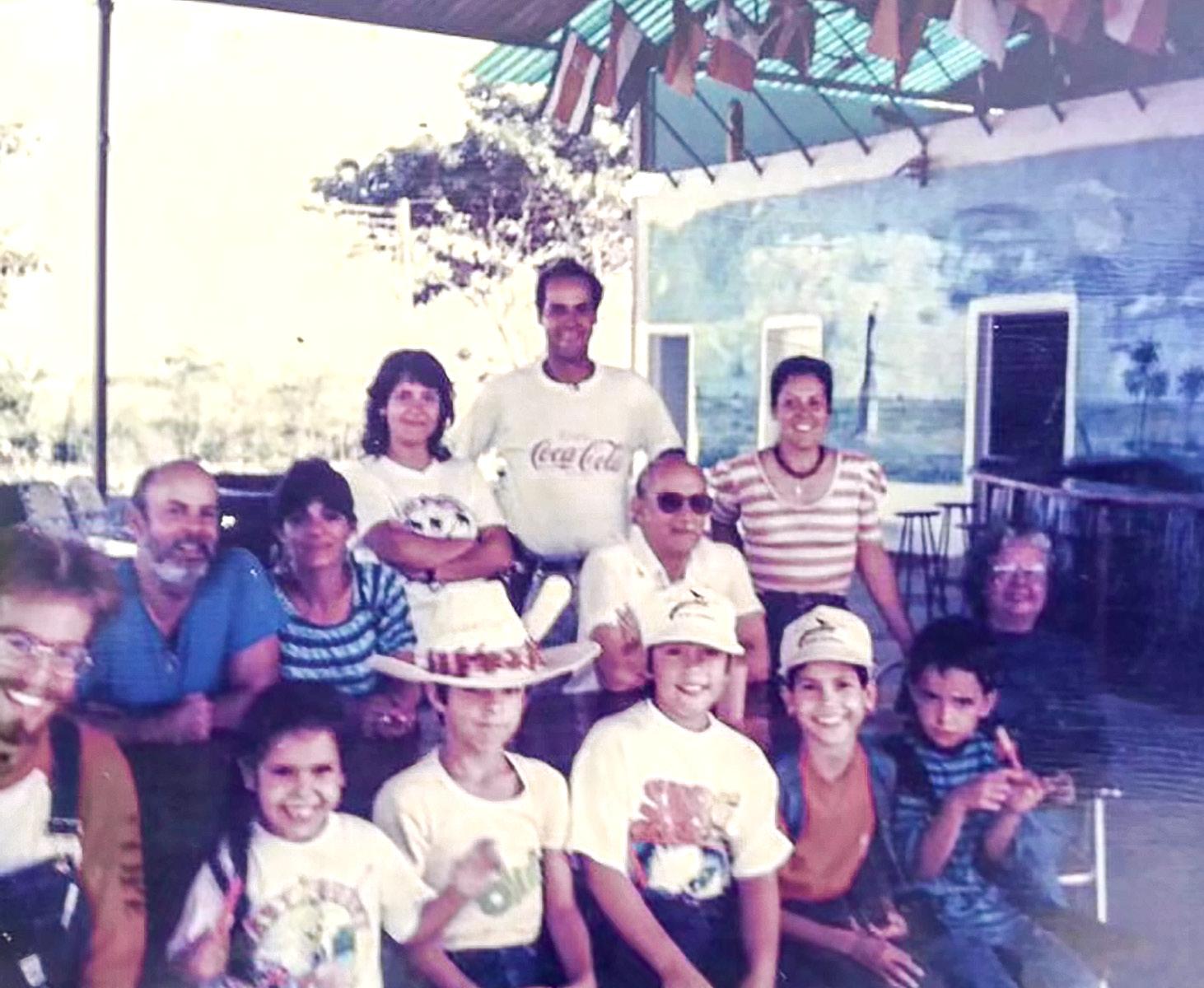
This is Calabria, the scenic and storied region where cooks maintain a food culture unique to Italy, each dish a tale of tradition and terroir. Calabria is the kingdom of eggplant and tomato, where every cook knows dozens of ways to prepare these vegetables, together and separately. Pork, lamb, and goat are the dominant meats, roasted simply with wild herbs and potatoes, or made into rustic, slow-cooked pasta sauces. The sea yields incomparable tuna and sword sh, anchovies and sardines, as well as octopus, clams, and mussels.
Rooted in the garden and enlivened by the peperoncino (hot pepper), Calabrian cooking is rustic, spicy, and deeply avorful.
Much like Barbara herself.The Italian-born beauty spent her youth immersed in Calabrian culture. “My mom’s side is from Salerno, just below Napoli, in the north, and my dad’s side is Calabrian, from a little town in the mountains called Saracena. I spent almost every summer with my grandmother in Calabria. Even after we moved to Venezuela, my parents would send me, and I loved it!”
“Sundays were always my favorite. They would have this long table for lunch with all the family, aunts, uncles, cousins, neighbors. I loved being in the kitchen, sneaking tastes of the tiramisu and helping my aunts with the dough. As I got older, I would sit for hours with whatever basket the neighbors brought over … fresh gs, fava beans, whatever was in season … helping prepare them for the Sunday meal. Hours and hours of cooking and eating and laughing and playing, and then cleaning up. Those memories inspire me to this day. Such a happy time. I wish my kids had that. Even though we eat together, it’s not the same.”

Barbara’s blue-grey eyes well up with happy tears. “I’m so emotional,” she says with a smile, wiping the tears. “I cry over everything. It’s the Italian in me.”
She’s not wrong. Over an al fresco lunch, Barbara’s emotions spill over into the meal easily and often. But in an endearing way.
“The restaurant is my child,” she explains. “I always say I have four kids. First, my daughter. Then Peperoncino. And now my two boys.”
Her oldest daughter is now 17, and Peperoncino just turned 14. (The boys are 6 and 7.) And much like children, those years have been lled with peaks and valleys. “Love and divorce. Birth and death. People have lied to me, stolen from me, broken my heart, and my wallet. Covid nearly ruined me.
Eight year old Raul (bottom row, red shirt) at the Lounge and Restaurant on his family’s ranch in Venezuela.
But every day when I walk into the kitchen and I turn on the gas, I’m home. And the customers are my family. Some have been coming three or four times a week for 14 years. And still, they taste the food and they cry, saying I just tasted my nonna’s supper. And then I cry again. It’s so emotional. But that’s beautiful, right? That’s food. That’s life.”
And indeed, for Barbara, it’s all about the food. The food she ate as a young girl in Calabria, lovingly replicated in various forms on her menu. The purest expression of her love of family, friends, heritage, and hospitality in every bite.
A tavola!
Raul has been hosting and entertaining, in one form or another, for some four decades now. He’s always had that certain élan, a masterful blend of charm and charisma. He banters irtatiously with anyone who listens; his hands move with the uidity of a con dent man dealing an ace from the bottom of the deck. And oh the stories this man can tell. A gregarious, con dent storyteller, Raul’s colorful anecdotes pepper every conversation he has, whether it’s two minutes or two hours.
Consider the espresso sidecar—a small glass of sparkling water or seltzer served alongside the demitasse.“Espresso is a really concentrated, intense beverage. When it’s a well-balanced shot, that intensity is unbelievable because it’s a lot for your palate at once,” Raul explains. “It’s nice to have something to prepare your palate, then cleanse it, possibly during and at the end of the cup. It’s a beautiful little tradition that I recently discovered and now I share it with everyone I like.”
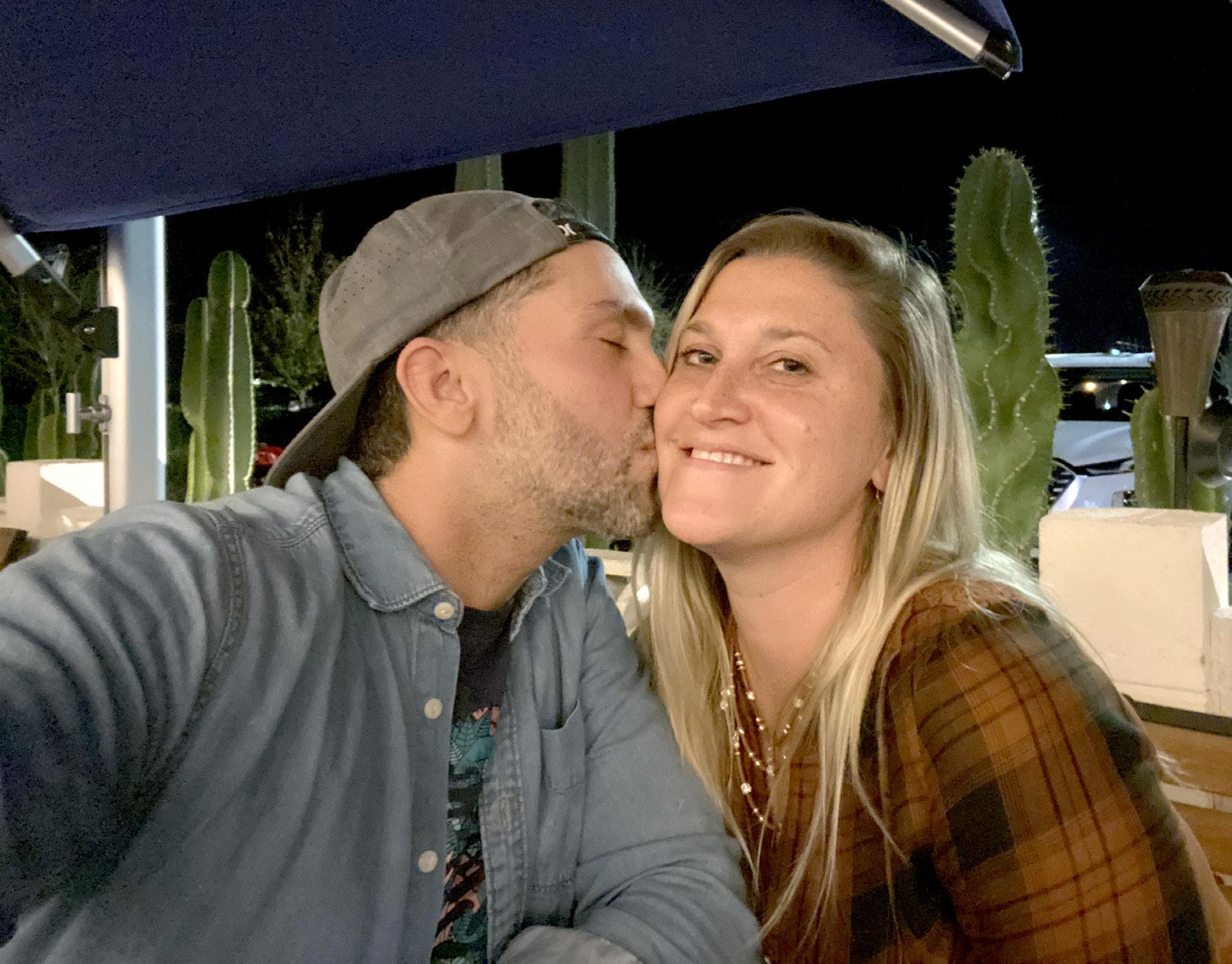
Or the way he gets incredibly excited about curating Peperoncino’s wine list. “You nd grapes here that you won’t nd anywhere else. It’s going to Italy without the passport and the jetlag.” Something that we can all thank them for.
His career has orbited the world of food and drink nearly from the start. “I grew up in Venezuela, in the country. My family had a working ranch and a hotel, where we hosted guests from around the world. I remember as a little boy, as early as 8 or 9, being a guide, a host, and the one responsible for taking care of the children of the guests. This was the late ‘80s, early ‘90s, it was a di erent Venezuela at that time.
““My grandfather, a proud University of Texas alumnus, had the idea for adventure tourism long before it became popular,” Raul says. And then takes a moment to add, “My Left: First date magic and the beginning of something beautiful.
Right: Pecorino Fritto drizzled with honey and spicy peperoncino.
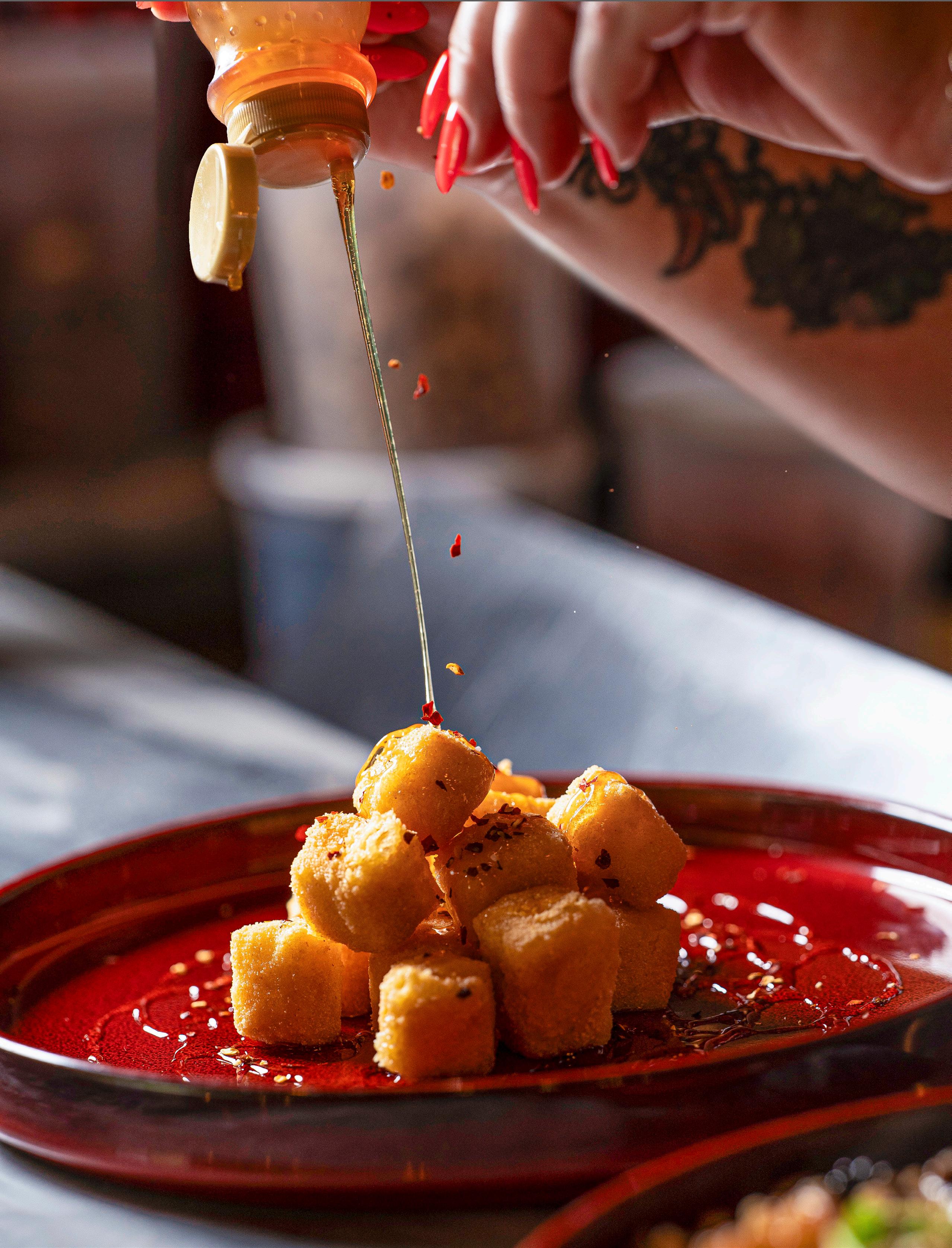
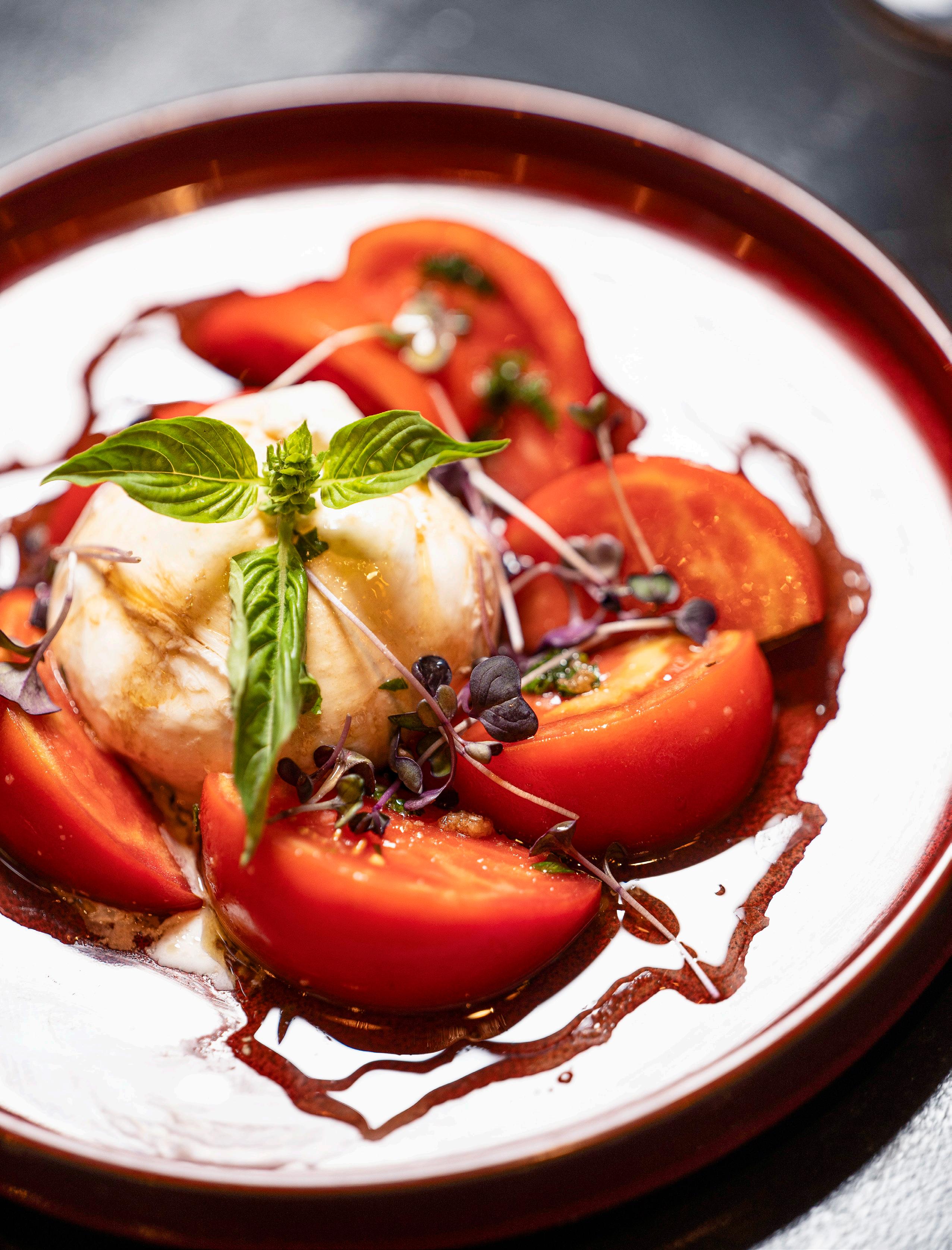

whole family would come to America to study. It’s why we all speak such good English. Anyway, he managed the ranch, established a hotel, and even became a private pilot.
“At the hotel, we welcomed between 80 to 120 guests who would arrive in Caracas. Then, my grandfather would personally y them to our ranch. We o ered private charters and a range of activities such as piranha shing, horseback riding, animal sightings, bird watching, hiking, and swimming. Overall, we aimed to provide our guests with the best possible experience.
“But what I learned early on was how to take care of guests. How to connect with people. How to talk with strangers. How to entertain. My grandfather has this amazing ability to make people feel at ease and make them feel special. Depending on the personality of the guest, he would invite them to a little table he had set aside for private conversation, and he would decide what kind of drink to serve that guest. Hospitality at its nest, and he was never wrong in his choices. Because he paid attention, he listened. It’s kind of the same process I use now when I decide what kind of wine to serve a guest. Sometimes it’s just instinct, but even after talking to you for a few minutes, I can always learn something that will tell me what to pour for you.”
By all accounts, growing up on the ranch was an extraordinary experience, but Raul always yearned for more. In college, he pursued a degree in journalism and spent ve years in television, radio, and corporate journalism before nding himself disillusioned with the career. So he went back to school for sales and marketing and was immediately recruited into the high-pressure world of pharmaceutical sales. A job that ultimately relocated him to Spain.
What he learned during those six years was a now-e ortless ability to read a room and to make a sale. “Pharmaceutical people are monsters of sales, training, and conventions. You learn quickly that you have only two minutes to make an impact, to stand out, to make a sale. Dozens of other companies are competing for your spot every day. It’s a madhouse, literally a hamster wheel. You’re always chasing a number, and when you catch it, it changes.”
When it came time to reinvent himself yet again, Raul decided to return to his roots: hosting and entertaining. He began taking seasonal jobs in the restaurant industry throughout Europe, spending time in Belgium, Germany, France, Holland, and Spain. When family members in the Orlando area encouraged him to come to America, his multicultural background and international experience opened the door to a work visa. “My English was already good, but I spoke three other languages, which made me valuable to companies like Disney with a high number of international travelers.”
After a few years, more family made the move to his home with his two children, now 16 and 12.
“When I started to look for work, Peperoncino was hiring. Barbara hired me as a dishwasher,” he says with a laugh. “That was early 2018. But I think because of my personality, work ethic, and experience, I quickly took on other roles. Kitchen prep, ordering, and then cooking when Barbara needed help. But then one day, we’re cooking and
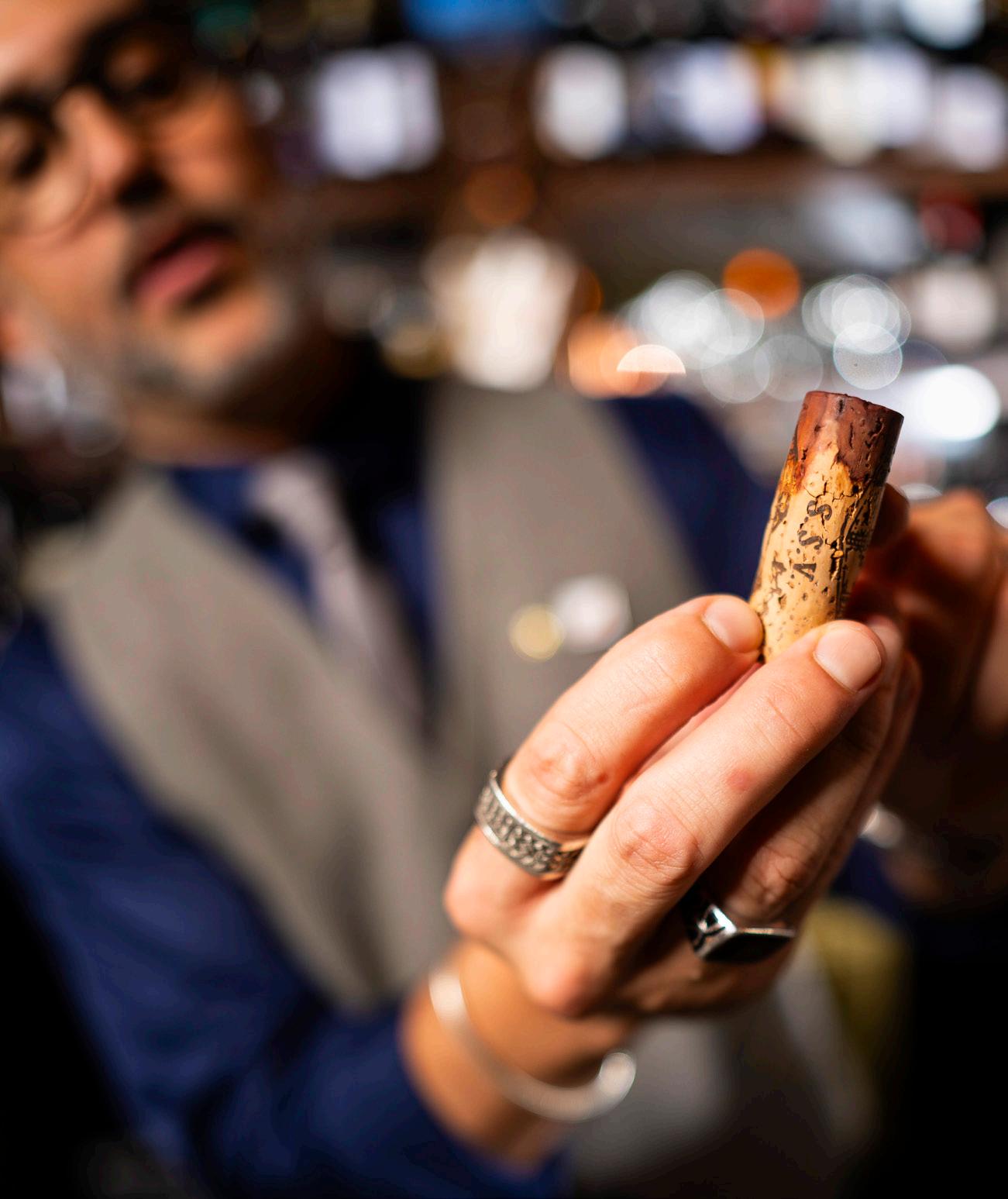
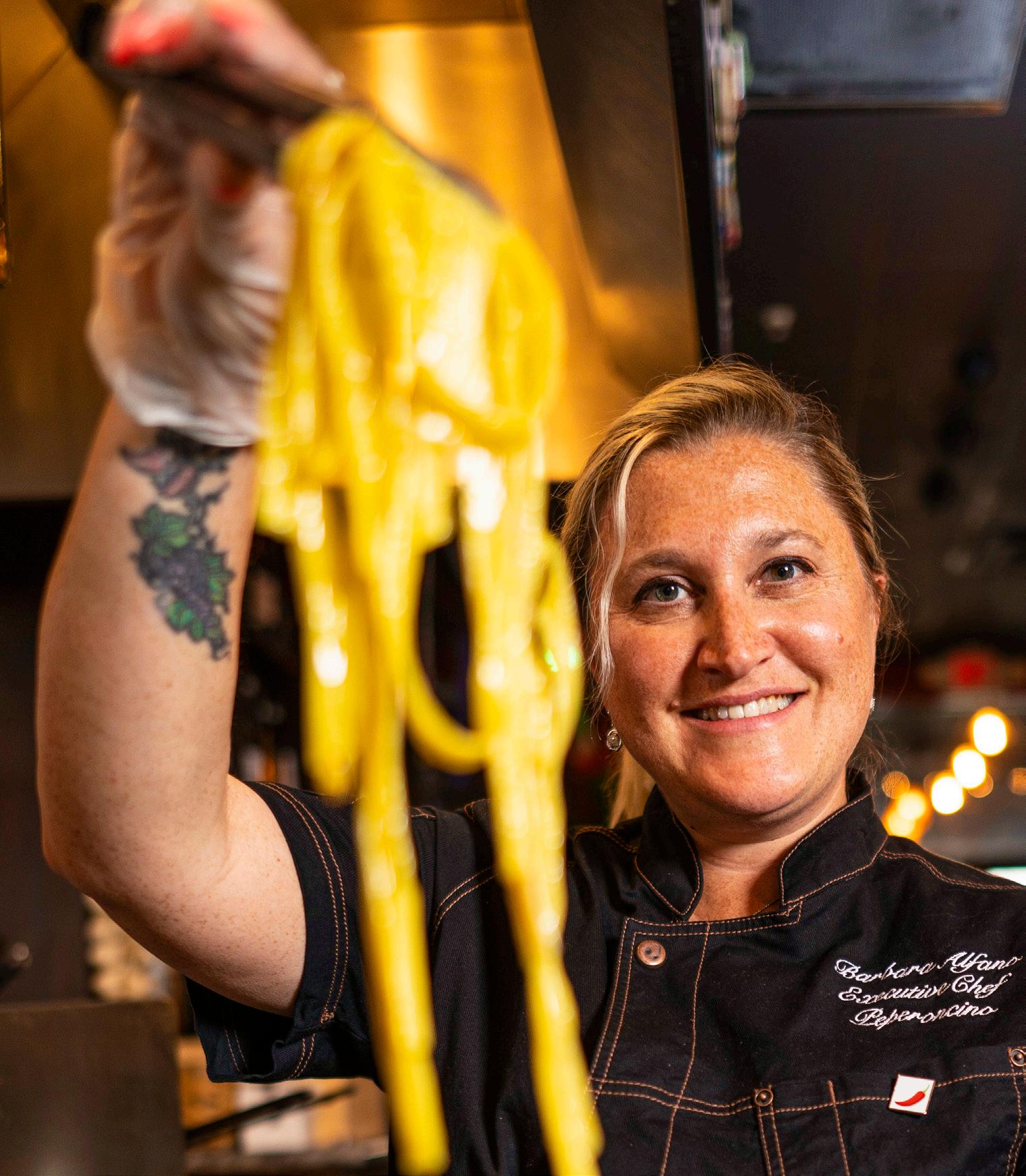
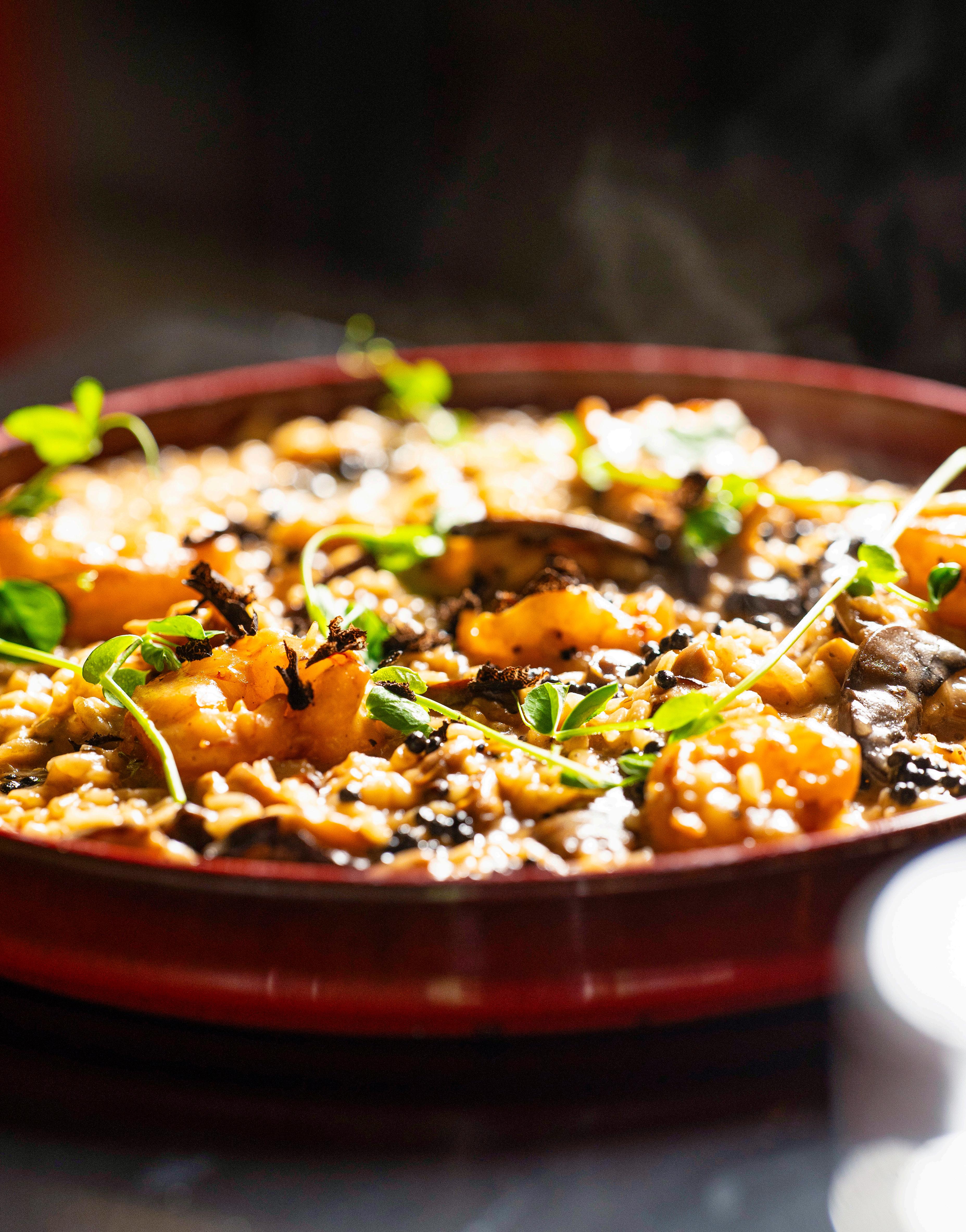
of the kitchen and start talking to guests.’ And that was a game changer for the restaurant. The storytelling, the sales, the guest experience … all my life’s experience nally started to make sense. Everything shifted. For the better. She saw how good I was with guests and how that made them feel. How I was able to describe the food and the wine. After a little while, she asked me to train everyone, and then I eventually took over the front of the house.”
That’s Amore
Pairing Barbara’s expertise in creating authentic, but approachable dishes with Raul’s evocative narratives is a ve-star recipe for success. The respect they have for one another is palpable, and they each stay in their own lane. Barbara in the kitchen; Raul as the culinary tour guide.
“People ask me all the time what my favorite dish is, but it’s not about me. Who cares what my opinion is,” Raul says with a laugh. “It’s more important to know what you like and what you don’t like. And sharing the stories of Barbara’s food … where the inspiration came from, the legacy in every dish. What
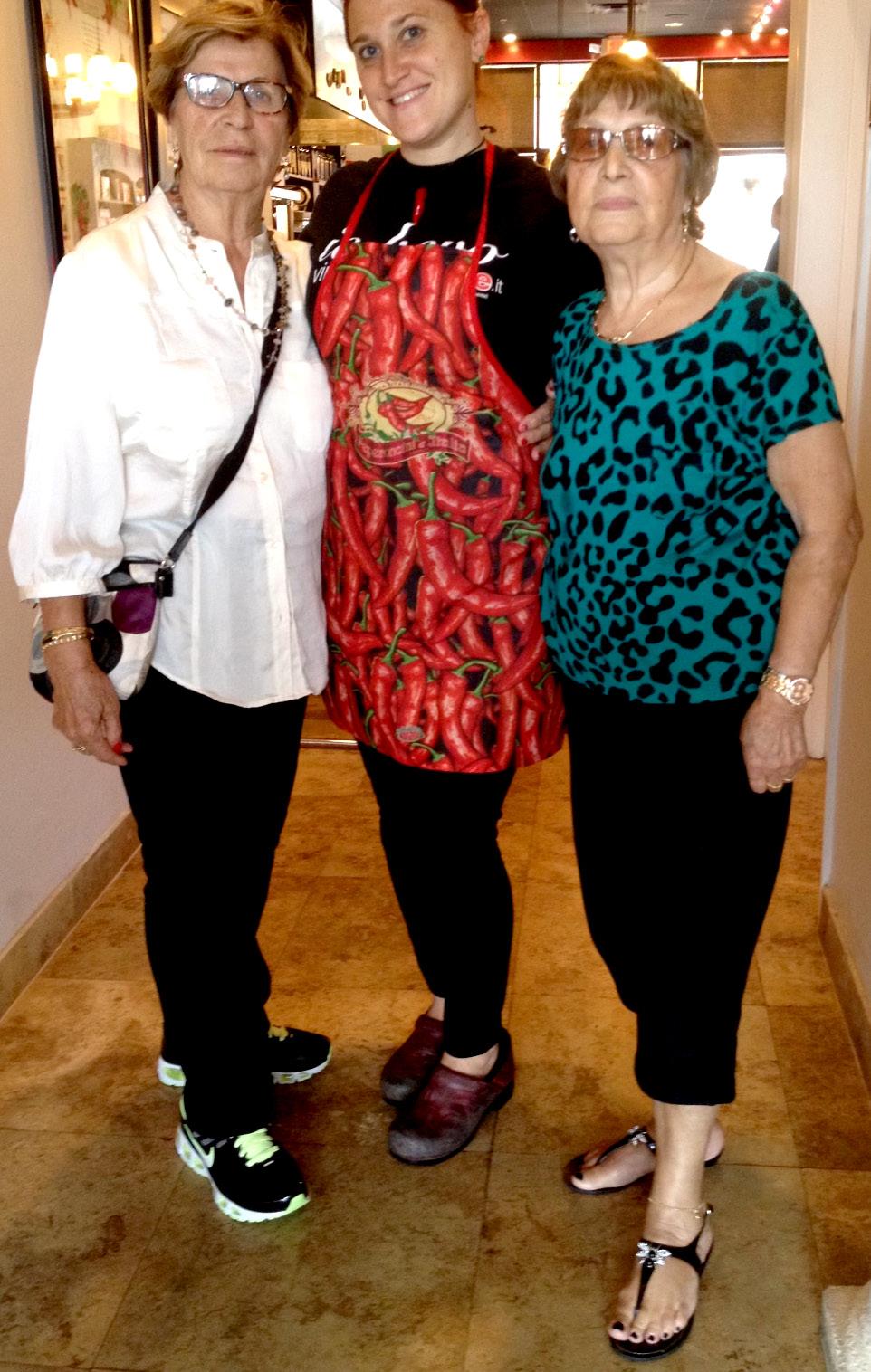
From with Love
I do is simply match the ingredients and avors you like with the stories of Barbara’s food.”
That deep-rooted respect blossomed into a deep friendship and eventually a romantic relationship anchored by a shared passion for the restaurant. Only Barbara says it a little di erently: “Love gifts—it is truly a match made in culinary heaven.
“You want to know why everybody loves Peperoncino? I’ll tell you in one word,” says Raul. “Family. There are plenty of good restaurants, but you come here for something more, to feel connected to something bigger than the food on the plate. The people, the human connection, that sense of being home, that’s what this place is all about.” is the most important thing. Love for the food, love for the people, love for one another.”
Brought together by fate, this team is a palpable force to be reckoned with on the food scene in Central Florida. With their authentic roots, family-like setting, and deep-rooted respect for the other’s
I nod in agreement, but am entranced by precisely what is on our plates: the gnocchi are plump, the chunks of succuluent osso bucco, the pecorino melting into buttery pools in the rich, smoky sauce. The diners next to us crane their heads for a better look. “Excuse me, what is that?” one of them asks. Before I can reply with a sample, Raul is there in a ash, bringing extra from the kitchen. “Try this, you’re going to love it. It’s Chef Barbara’s special tonight. Her Nonna used to make a version of this, but she does it better.”
Their faces illuminate, Raul starts to tell more stories, and soon they’re laughing with delight— enjoying something bigger than the food on the plates, indeed.
